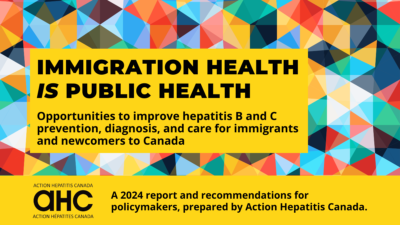Uncovering gaps in hepatitis B and C services for immigrants and newcomers: A new report from Action Hepatitis Canada

Immigrants and newcomers make up almost a quarter of Canada’s population, contributing enormously to the social, cultural, and economic vitality of our country. To ensure Canada upholds its commitment to the well-being of newcomers and the strength of our diverse communities, it’s essential to prioritize equitable access to healthcare. This not only safeguards the individual health and dignity of newcomers but also nurtures the resilience and prosperity of our society as a whole.
Ensuring equitable healthcare means acknowledging that immigrants may have distinct needs due to cultural and linguistic barriers or other social determinants of health. They may also be at an increased risk for certain conditions that are more prevalent in their countries of origin. For instance, hepatitis B and C are more common in certain regions of the world and can lead to serious health consequences unless people receive treatment. Treatments for both hepatitis B and C significantly improve individual health outcomes, reducing the risk of liver disease and liver cancer while reducing financial strain on Canada’s healthcare system.
Offering newcomers early detection and treatment services for viral hepatitis has clear benefits and is crucial for achieving Canada’s goal of eliminating viral hepatitis as a public health threat by 2030. This is why Action Hepatitis Canada (AHC) directs its focus towards immigrants and newcomers in the second installment of its series of reports aimed at advocating for human rights approaches to eliminating viral hepatitis among priority populations.
Immigration health is public health
The latest report, entitled Immigration Health is Public Health: Opportunities to Improve Hepatitis B and C Prevention, Diagnosis, and Care for Immigrants and Newcomers to Canada was released on May 9, 2024. It was developed by a working group of AHC members, who came together to approach the issue of viral hepatitis through a health equity lens that centres lived experience. While we acknowledge the important role of community-level education, as well as provincial and territorial public health agencies, the report focuses on federal government policies and potential points of intervention within the immigration and integration processes.
The report provides information on viral hepatitis elimination among immigrants and newcomers, as well as an overview of the current state of viral hepatitis among this priority population, their right to care and the challenges and opportunities they face in Canada. It concludes with seven key recommendations to the Government of Canada.

Why focus on immigrants and newcomers?
People arriving from abroad account for nearly all growth in the Canadian labour force, addressing challenges arising from an aging domestic population with lower fertility rates. Immigration targets currently call for half a million new permanent residents annually in 2025 and 2026. In this context, it is important to maintain an adequate infrastructure to support immigration-based growth, including within our healthcare system. This requires considering the ways that the health needs of migrants differ from those of individuals born in Canada, including how to address conditions such as viral hepatitis.
The prevalence of viral hepatitis is at least twice as high among immigrants and newcomers as among people born in Canada, accounting for 30% of hepatitis C cases and up to 70% of hepatitis B cases in the country. Immigrants and newcomers are also less likely to know if they have hepatitis C, with delays of up to 10 years between arriving in Canada and receiving a diagnosis, which results in higher chances of liver cancer and liver-related death.
Because I was a government-sponsored refugee, I was offered resettlement orientation and a health orientation at the refugee health clinic. There were a number of tests that were offered to everyone routinely, and that was how I was diagnosed with hepatitis B. But many refugees don’t come to a clinic like this.
– Biniam, came to Alberta as a refugee and now works as a health navigator at the refugee clinic
How was this report written?
From January to April 2024, we interviewed six individuals with lived experience of hepatitis B or C as well as experience migrating to Canada. We consulted with a diverse cohort of experts, including clinicians, researchers, community-based advocates, immigration legal experts, the Public Health Agency of Canada, as well as Immigration, Refugee and Citizenship Canada. We also conducted a review of the existing relevant studies to complement the opinions and experiences of those consulted.
As sometimes happens, we feel the value of the report lies as much in the process as in the final report itself. Through these interviews and consultations, we began many meaningful conversations about intersections between Canada’s public health and immigration services. It is our hope that this report will be a useful tool to continue those conversations and ultimately improve health outcomes for immigrants and newcomers to Canada. We hope it can also reduce the impacts of late-stage diagnosis on the healthcare system and help move us closer to our viral hepatitis elimination targets.

What are some of the current challenges in the immigration process?
- There are no systematic, targeted screening or health promotion programs for hepatitis B or C tailored to immigrants before or after their arrival in Canada.
Implications: Despite the high burden of viral hepatitis, immigrants and refugees are less likely to be screened and treated, have a low awareness of hepatitis, experience stigma and fears around hepatitis and face high costs for testing and treatment. The barriers to care that they face put them at higher risk of late diagnosis and advanced liver disease due to hepatitis B or C. In fact, they are more likely to already have liver cancer by the time their hepatitis is diagnosed, and more likely to die during a liver-related hospitalization than people born in Canada because of these barriers.
- According to the Immigration and Refugee Protection Act (IRPA), an immigration application can be denied if the applicant is expected to place an “excessive demand” on Canada’s public health care system and is deemed medically inadmissible.
Implications: Costs related to viral hepatitis can be included in calculations and can contribute to an applicant being denied. The assessment can also add months or years to the immigration process, act as a deterrent to immigration and expose individuals to ableist and discriminatory stigma.
- The immigration application includes medical questions mixed in with questions about being a security risk, with an implication that checking ‘yes’ to any may result in an application being denied.
Implications: The medical component of the immigration process is so enmeshed with eligibility that immigrants are disincentivized from declaring or voluntarily testing for sexually transmitted and blood borne infections (STBBIs) or other health conditions. The long-term societal costs of delayed diagnosis and care are significant.

The report’s seven recommendations to the Government of Canada
- Eliminate provisions in immigration legislation that deny entry or stay in Canada based on medical conditions and instead prioritize linking people to care.
- Decouple medical counselling and testing from the immigration application process and instead offer as part of integration services.
- Offer free, universal, voluntary STBBI testing, including for hepatitis B and C, to all migrants, for the purpose of linking people to care and treatment, and clearly communicate this is the purpose of any testing.
- Provide interpretation services free of charge at all medical appointments as part of the immigration or integration process for people who do not fluently speak the language in which the service is being provided.
- Establish policies to improve the competency of healthcare professionals (including panel physicians) to ensure migrants receive culturally appropriate, non-stigmatizing care and accurate information.
- Amend the eligibility provision of the Interim Federal Health Program (IFHP) so that all migrants, including undocumented migrants, can access publicly-funded healthcare. This includes primary care, language services and referrals to specialists for all IFHP-eligible migrants.
- Update the national hepatitis B vaccination guidelines to recommend birth dose vaccination for all babies and universal “catch-up” vaccinations for unvaccinated adults as needed.
My hepatitis B was a bottleneck in my immigration process. A health condition should not stop the process, but if it is important for the government to know about my health condition, don’t stigmatize. The way the question was written on the application, it was clear that if you had any of these conditions, your application might not be successful. Either all immigrants should be tested for these diseases, or they should reword the application so people don’t hesitate to disclose their health conditions.
– Ravshan
Ensuring equitable healthcare access is central to achieving Canada’s commitment to eliminate viral hepatitis as a public health threat by 2030. Service providers working with immigrants and newcomers are encouraged to support this goal by engaging with AHC’s report and implementing its recommendations in their work. By taking action to increase testing and prevention, as well as connect people to treatment and care for viral hepatitis, we can all help build a healthier and more inclusive society.
Download the full report and find shareable resources here.
Jennifer van Gennip is the executive director for Action Hepatitis Canada, a pan-Canadian coalition providing community accountability on Canada’s commitment to eliminate viral hepatitis as a public health threat by 2030. She lives in Barrie, Ontario and specializes in advocacy communications for non-profits.
